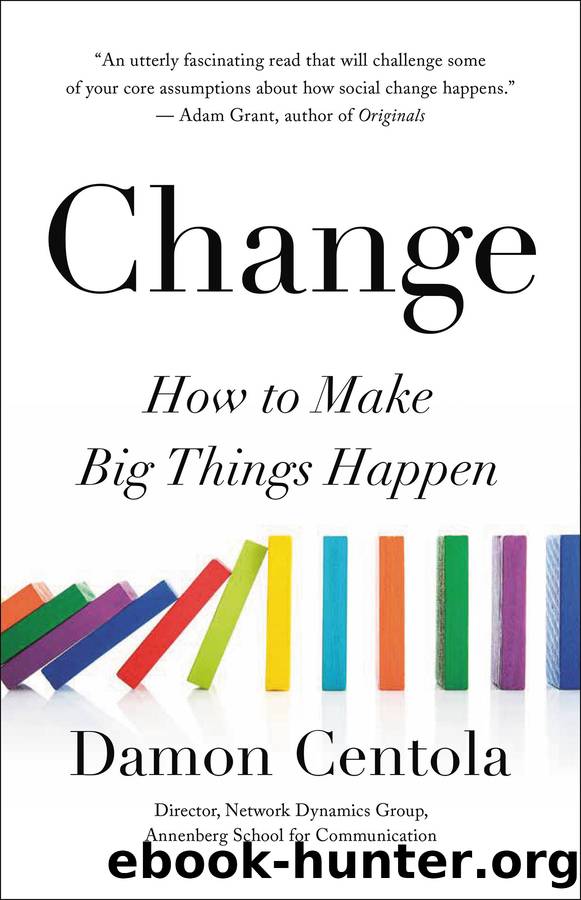Change by Damon Centola

Author:Damon Centola [Centola, Damon]
Language: eng
Format: epub
Publisher: Little, Brown and Company
Published: 2021-01-19T00:00:00+00:00
Wittgenstein Goes to Kindergarten
In the autumn of his thirty-third year, philosopher Ludwig Wittgenstein became famous. Wittgenstein was a gaunt, severe-tempered Austrian intellectual, virtually unknown until he announced his presence on the world stage with a short, almost impenetrable treatise that altered the course of philosophy. Following in the footsteps of his mentor, British philosopher Bertrand Russell, Wittgenstein had developed a tight analytical theory of how language works. He saw language as a logical system that unraveled the mysteries of the world. For Wittgenstein, language was everything. If you understood language, then you understood the world.
His ideas became the foundation for an entire generation of philosophy, linguistics, mathematics, and even sociology. It only heightened Wittgensteinâs renown that he had achieved folk-hero status during World War I. As legend has it, he penned the final version of his treatise as a prisoner of war during the last year of the conflict. Returning home, he published his treatise and became an overnight sensation.
But thatâs not the best part of the story.
After becoming famous, Wittgenstein mysteriously disappeared. He turned his back on academic philosophy and retired to the country.
A decade later, Wittgenstein returned to the University of Cambridge with a new big idea. His long hiatus was a one-man paradigm shift that again altered the course of philosophyâthis time in the opposite direction. Wittgensteinâs new work claimed that his first theory of the world, for which he had become well known a decade earlier, was complete nonsense. It was a waste of time. He reportedly said that anyone still working on it should quit their job and do something more useful.
The field of philosophy has yet to recover.
Renowned Princeton University philosopher Saul Kripke said of Wittgensteinâs second treatise that it is still âthe most radical and original problem that philosophy has seen to date.â In 1999, a survey asked thousands of philosophy professors to identify the most important and influential work of the twentieth century. The ârunaway winnerâ was Wittgensteinâs second treatise.
Wittgenstein continued to believe that language was the key to understanding the world. But he no longer believed that logic was the key to understanding language. Rather, language was social. The secret to understanding language was to understand how people play coordination âgamesâ with one another.
How could one manâs thinking shift so radically from one intellectual extreme to the other? What happened during those years when Wittgenstein was locked away in the country, in retreat from philosophy?
He became a kindergarten teacher.
As his sister is rumored to have said, âIt was like using a precision instrument as a crowbar.â But he was not hiding, nor whittling away the time. He was experimenting with a new way of doing philosophy.
It turned out that Wittgenstein had been using the kindergarten as a kind of philosophical laboratory. He was observing the children: the way they played, the way they learned, the way they constructed meaning, and the way they followed social norms. Kindergarten was, for him, a laboratory for studying coordination dilemmas and how people solve them.
Wittgensteinâs new philosophy was that social life could be distilled into a series of coordination games.
Download
This site does not store any files on its server. We only index and link to content provided by other sites. Please contact the content providers to delete copyright contents if any and email us, we'll remove relevant links or contents immediately.
Bullshit Jobs by David Graeber(4190)
Radical Candor by Kim Scott(2723)
I Am Right, You Are Wrong by Edward De Bono(2441)
23:27 by H. L. Roberts(2249)
Nomadland by Jessica Bruder(2063)
Average Is Over by Tyler Cowen(1848)
The Conflict Resolution Phrase Book by Barbara Mitchell & Cornelia Gamlem(1779)
Out of Our Minds: Learning to Be Creative by Ken Robinson(1745)
High-Impact Interview Questions by Victoria A. Hoevemeyer(1691)
Who Moved My Cheese?: An Amazing Way to Deal With Change in Your Work and in Your Life by Johnson Spencer(1648)
An Everyone Culture: Becoming a Deliberately Developmental Organization by Robert Kegan & Lisa Laskow Lahey(1644)
The Ideal Team Player by Patrick M. Lencioni(1642)
The Asshole Survival Guide by Robert I. Sutton(1598)
Automatic Society by Bernard Stiegler(1556)
Unleashed by Anne Morriss & Frances Frei(1540)
Who by Street Randy & Smart Geoff(1506)
42 Rules of Employee Engagement by Susan Stamm(1477)
96 Great Interview Questions to Ask Before You Hire by Paul Falcone(1452)
Fish! by Stephen C. Lundin(1405)
